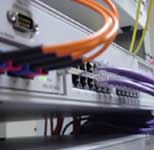Peering Dispute Between Cogent, SprintPeering Dispute Between Cogent, Sprint
Many customers of Sprint-Nextel and Cogent Communications (CCOI) are likely to be inconvenienced by a peering dispute between the two companies.
October 31, 2008

cables
Many customers of Sprint-Nextel and Cogent Communications are likely to be inconvenienced by a peering dispute between the two companies. Almost all major peering disputes these days seem to involve Cogent (CCOI), which has had earlier high-profile network spats with Telia, Limelight Networks, Level 3, France Telecom and AOL. This time, Cogent was quick to point the finger at Sprint, issuing a press release shortly after the de-peering occurred."On October 30 at 4:30 pm Sprint-Nextel severed its Internet connection to Cogent thereby partitioning the Internet," Cogent states. "It is no longer possible for many Sprint customers and Cogent customers to directly communicate across the Internet. Sprint did so in violation of a contractual obligation to exchange Internet traffic with Cogent on a settlement free peering basis. Sprint and Cogent are engaged in litigation over this matter."
It's the "settlement free" bit that is at the heart of the dispute. Peering allows providers to exchange traffic with one another at no cost (or low cost) by establishing direct connections between their networks, instead of routing traffic across the public Internet. Peering is often free as long as the amount of traffic exchanged is not out of balance, providing substantial cost savings for bandwidth for high-traffic sites and networks.
But when that balance of traffic between peering partners gets out of whack, someone usually wants to get paid. In this case, the circumstances suggest that it's Sprint. Cogent has always been known for its aggressive pricing, and in June it slashed prices even further in a bid to gain market share.
That doesn't make Cogent popular with other network operators, as CEO Dave Schaffer noted during the Telia dispute, saying other providers "have been reluctant peers with us.”
Who'll be affected? We'll hear the howling soon as customers realize what's happened. An example: the Cogent-Telia dispute caused major grief for gamers whose ISPs relied solely on Cogent, who found they couldn't access World of Warcraft.
At the heart of it, peering disputes are really loud business negotiations, and angry customers can be used as leverage by either side. This one will end as they always do, with one side agreeing to pay up or manage their traffic differently.
About the Author
You May Also Like







